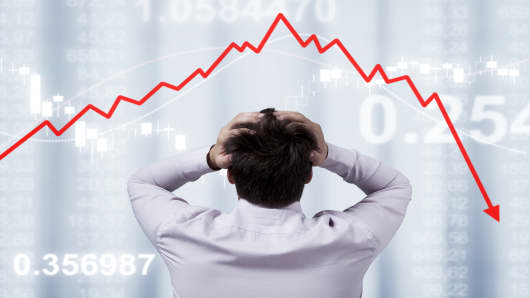The recent plunge in gold prices reflects a loss of faith in quantitative easing measures by central banks in the West, and the next asset class that could be vulnerable to heavy selling is equities, according to Dhiren Sarin, chief technical strategist at Barclays.
"The breakdown in gold in euros and U.S. dolars tells us that some of the belief in quantitative easing measures has faded, and policies by central banks aren't flowing through to investors. The asset class most vulnerable for a selloff after commodities is likely equities," Sarin told CNBC on Monday, who expects European and U.S. stocks to be most at risk.
Gold posted its biggest one-day drop in 30 years last week falling to as low as $1,339 an ounce. However the precious metal has since
pared back some losses
, rising 1.2 percent on Monday to $1,421 an ounce.
"The recent dramatic drop [in gold] coincided with the largest declines seen since 2011 in copper on a weekly basis and the largest decline of the year in the S&P. Thus, we believe it is damaging for risk sentiment," he added.
(Read More: When Will Investors Fall Back in Love With Gold?)
U.S. stocks last week posted their worst weekly drop of the year, with the Dow Jones Industrial Average declining 2.1 percent. European equities were also caught in the downdraft, with Germany's DAX Index slumping to a four month low, down 3.7 percent over the same period.
"The move lower in equities is not completely over, the DAX's new lows is a bearish signal," he said, forecasting a 4-6 percent downside for the market by the end of May.
As for U.S. stocks, if the S&P 500 were to drop through 1535, or 1.3 percent lower from current levels, it would be a negative signal, according to Sarin.
(Read More:
Why Fed, ECB's 'Great Job' Is Not Enough
)
"Over the past one and a half years, we have had three big selloffs of 10 percent each. Based on this, we could have up to 7 percent left to go from current levels in an aggressive scenario," he said. "In stocks, for the next few months, we are looking to sell bounces."
While U.S. and European equities have taken a hit from the fallout in gold prices, Japanese equities have held up well in spite of the Bank of Japan's recent radical quantitative easing policies to reflate the economy.
"Japan is an exception. There is inherent demand for anything against the yen, which keeps the Nikkei supported," he said, referring to the inverse relationship between the yen and benchmark index.



